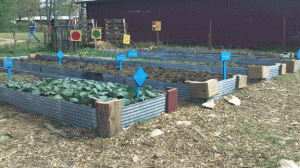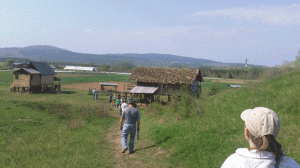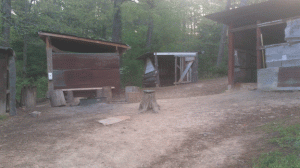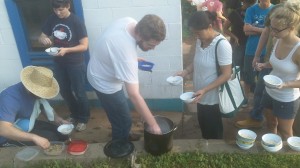Instead of the Dishes » Arkansas, Not the Dishes, Travel, Write & Blog » Heifer Ranch’s Global Village: A “Think Tank” for World Food Day
Heifer Ranch’s Global Village: A “Think Tank” for World Food Day
For most of us, three square meals a day is something we take for granted. But, thousands of people are dying of hunger across the world every day. Yesterday, October 16th, was World Food Day and also Blog Action Day, a day in which bloggers all pledge to blog about the same subject in order to create awareness. This year’s theme is FOOD.
Here in Little Rock we have the privilege of having access to many different educational opportunities through Heifer International. Headquartered here in Little Rock, Heifer’s mission is to work with communities around the world to end hunger and poverty and care for the earth. Back in April, I had the opportunity to take part in the Global Gateway program at Heifer Ranch. It was really the first time I ever put a lot of thought into world food, and it was certainly an eye-opening experience.
The Global Gateway program is an overnight immersion experience in which participants are divided into “countries” and sent to spend the night in a typical “home” for that country. Each group is given the amount of food a typical family in their country would have. Countries that make up the “Global Village” at Heifer Ranch include Taiwan, Zambia, Guatemala, Appalachia, urban slums, and a refugee camp. (Yes, those last three are not actually countries, as Appalachia refers to the Appalachian Mountain region in the Eastern US, and urban slums and refugee camps can be found in many different countries.)
I took part in this experience with a group of adults, primarily writers, and mostly college students. However, the program is available for 6th graders and older. After taking part in some ice breakers and activities that center around self-identity, we toured the village and then were assigned to our homes. I landed in the largest group and was assigned to the urban slums, which featured doorless, dirt floored shacks and one larger shack with a wood floor. We were given a basket of supplies and our food – about 3/4 a cup of white rice. For six of us. Meanwhile, we watched the Guatamalans and the Taiwaneese families trot off to their homes with baskets full of cooking gear and eggs and vegetables to go along with their rice.
Once we had made our camp and figured out what we had to work with, we immediately set to work trying to gather firewood and figure out how to get the other countries to share their food with us. With the advantage of having a village full of reasonable adults, we ended up pooling all our food together for one big dinner, but it took hours to coordinate and cook. We ate in the pitch dark and went to bed exhausted, knowing that in the morning those of us in the urban slums were responsible for cooking breakfast for the entire village, and then we would all be assigned chores. With six of us crammed into the one shack that had a wood plank floor, we didn’t sleep much. We all met the morning stiff and still tired.
I’ve never really been hungry for an extended period of time, and even at the global village there was enough food to make it through the 24 hour experience without much agony. But, I was struck by the difficulties of living in poverty and how much time and energy was taken up by basic life needs, primarily finding and preparing food.
Once I finally got to go to sleep, I layed there in the darkness, looking up through the open doorway of our shack at the moon, and thought about how different my mental state might be if I couldn’t comfort myself with the thought that I’d be back in my own bed the following night. What if I had to stay in the village for a week? What if this was my “real” life? What if my kids were here?
Just as I was deciding that I didn’t like the answers to any of those questions, the big tall college kid who was sleeping right in front of the doorway said, “You know, someone could just come up in the middle of the night and pull me right out of here by my feet.” So, even though I knew we were in a perfectly safe, controlled environment, I layed there for a little while longer and thought about how stressful personal safety would be in a “real” urban slum before I finally drifted off to sleep.
Originally I had visions of taking time to write during the experience, but there was really no time. And even when I got home I was so exhausted that I had to rest before I could reflect. I can’t imagine the wear and tear that a life of extreme poverty would put on your body, but when you are living from meal to meal, I imagine there isn’t much time to take stock of your own physical state or needs.
The reality is that there is hunger and poverty everywhere. Here in Little Rock there are homeless camps right in the middle of the city that most people don’t even know are there. In East Africa, 30,000 children have died over the past three months due to famine. We can all do our part to help. You can give locally or globally, raise awareness by helping to spread the word, or build a future of activists by educating your children about hunger and poverty.
If you’d like to learn more about World Food issues, you can visit Heifer International’s website, or better yet, one of their learning centers. If you’re here in Central Arkansas, you can also mark your calendar for this event:
October 27, 2011 – Catherine Bertini, former World Food Prize Laureate @ Clinton School of Public Service, Sturgis Hall, 12:00pm
A professor of public administration at the Maxwell School of Citizenship and Public Affairs, Bertini is the former executive director of the United Nations World Food Programme. She was the World Food Prize Laureate in 2003 and, in 2007, was awarded the Gene White Lifetime Achievement Award for Child Nutrition. Reserve your seats by emailing publicprograms@clintonschool.uasys.edu, or calling 501-683-5239.
Filed under: Arkansas, Not the Dishes, Travel, Write & Blog · Tags: Blog Action Day, Global Gateway, Global Village, Heifer, hunger, International, poverty, Ranch, World Food Day
















